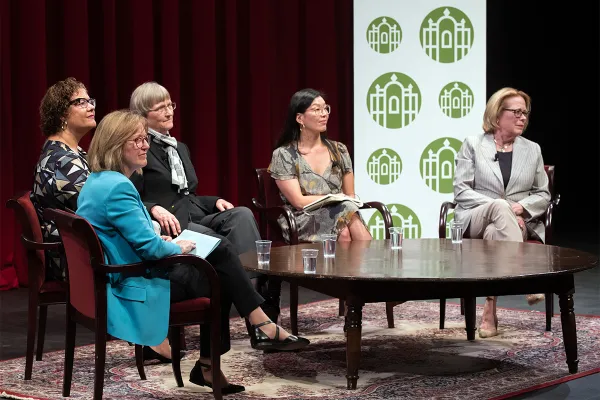Words of Wisdom from Extraordinary Women
Campus Life

Published May 18, 2019
On the eve of Commencement, Smith seniors, alums, family and friends gathered to hear words of wisdom from extraordinary women.
In a panel moderated by Smith College President Kathleen McCartney, some of Smith’s honorary degree recipients shared their perspectives on activism, engagement and making a difference in the world.
The conversation turned repeatedly to issues of voice. Poet and scholar Elizabeth Alexander, president of The Andrew W. Mellon Foundation, recalled her first years as a student at Yale. Uncomfortable in her new surroundings, she found herself oddly quiet in class, until a faculty member “saw” her. (“I think you’re a closet Wordsworthian,” he said. “And I was!” she laughed.)
“That feeling of being recognized is all that it took,” she said. “Once I started talking—once my friends and I started coming to voice—we would not stop. It was a galvanizing moment: coming to voice in community.”
Activist and social innovator Ai-jen Poo praised the power of stories to bring us together. The MacArthur “genius” grant recipient noted that she frequently begins meetings by asking everyone to share a story about someone who took care of them. “When we find the place where we can drop into shared experience, shared humanity—those moments are so powerful. They’re places you can lead from, and places you can follow from.”
Former Massachusetts congresswoman Nicola “Niki” Sauvage Tsongas ’68 echoed the importance of finding common ground. “When i was in Congress, we had a policy that we wouldn’t disrespect anybody,” she said. “There were certainly people that you could disagree with—sometimes viscerally—but we wouldn’t disrespect anyone.”
The honorands spoke of leadership -- and of followership. "We talk a lot about leadership, said Drew Gilpin Faust, a historian and the president emerita of Harvard University. "But followership is important, too." She framed the issue in terms of Abraham Lincoln and the Civil War. “What is it, “she asked, “that moved so many people to fight for their country—that allowed them to think that someone was talking directly to them? What is it that enables someone to feel noticed? What enables someone to be inspired?”
And the panelists noted the importance of today's historical moment—the critical opportunities provided for this particular generation.
“I feel so hopeful,” Poo said, “because of the energy, the spirit and the moral clarity of this generation. We have young people who are champions for fighting climate change, fighting gun violence.
“I really feel that this is the generation to lead us,” Poo added, “and to work across generations for change.”